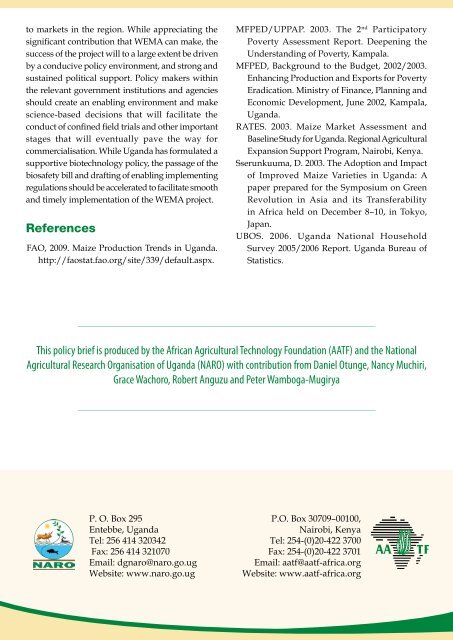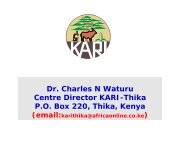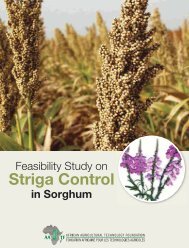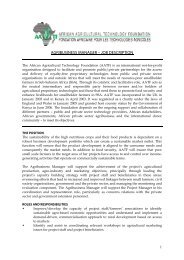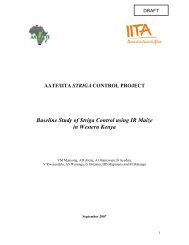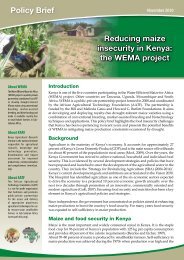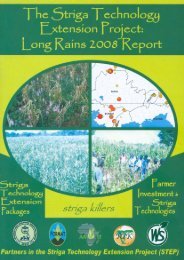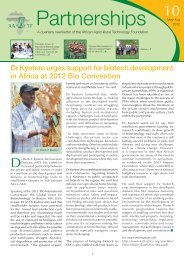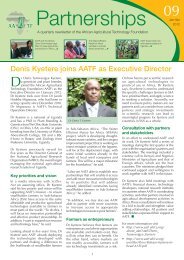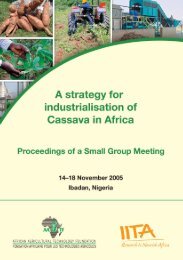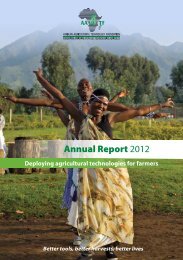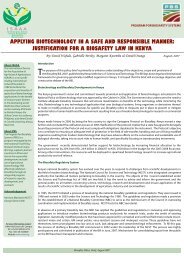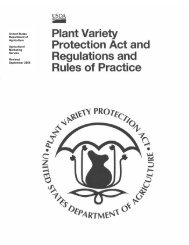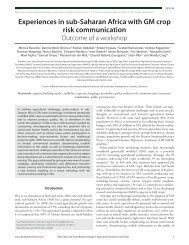Enhancing maize productivity in Uganda through the WEMA project
Enhancing maize productivity in Uganda through the WEMA project
Enhancing maize productivity in Uganda through the WEMA project
You also want an ePaper? Increase the reach of your titles
YUMPU automatically turns print PDFs into web optimized ePapers that Google loves.
to markets <strong>in</strong> <strong>the</strong> region. While appreciat<strong>in</strong>g <strong>the</strong><br />
success of <strong>the</strong> <strong>project</strong> will to a large extent be driven<br />
by a conducive policy environment, and strong and<br />
susta<strong>in</strong>ed political support. Policy makers with<strong>in</strong><br />
<strong>the</strong> relevant government <strong>in</strong>stitutions and agencies<br />
should create an enabl<strong>in</strong>g environment and make<br />
science-based decisions that will facilitate <strong>the</strong><br />
stages that will eventually pave <strong>the</strong> way for<br />
commercialisation. While <strong>Uganda</strong> has formulated a<br />
supportive biotechnology policy, <strong>the</strong> passage of <strong>the</strong><br />
biosafety bill and draft<strong>in</strong>g of enabl<strong>in</strong>g implement<strong>in</strong>g<br />
regulations should be accelerated to facilitate smooth<br />
and timely implementation of <strong>the</strong> <strong>WEMA</strong> <strong>project</strong>.<br />
References<br />
FAO, 2009. Maize Production Trends <strong>in</strong> <strong>Uganda</strong>.<br />
http://faostat.fao.org/site/339/default.aspx.<br />
MFPED/UPPAP. 2003. The 2 nd Participatory<br />
Poverty Assessment Report. Deepen<strong>in</strong>g <strong>the</strong><br />
Understand<strong>in</strong>g of Poverty, Kampala.<br />
MFPED, Background to <strong>the</strong> Budget, 2002/2003.<br />
<strong>Enhanc<strong>in</strong>g</strong> Production and Exports for Poverty<br />
Eradication. M<strong>in</strong>istry of F<strong>in</strong>ance, Plann<strong>in</strong>g and<br />
Economic Development, June 2002, Kampala,<br />
<strong>Uganda</strong>.<br />
RATES. 2003. Maize Market Assessment and<br />
Basel<strong>in</strong>e Study for <strong>Uganda</strong>. Regional Agricultural<br />
Expansion Support Program, Nairobi, Kenya.<br />
Sserunkuuma, D. 2003. The Adoption and Impact<br />
of Improved Maize Varieties <strong>in</strong> <strong>Uganda</strong>: A<br />
paper prepared for <strong>the</strong> Symposium on Green<br />
Revolution <strong>in</strong> Asia and its Transferability<br />
<strong>in</strong> Africa held on December 8–10, <strong>in</strong> Tokyo,<br />
Japan.<br />
UBOS. 2006. <strong>Uganda</strong> National Household<br />
Survey 2005/2006 Report. <strong>Uganda</strong> Bureau of<br />
Statistics.<br />
This policy brief is produced by <strong>the</strong> African Agricultural Technology Foundation (AATF) and <strong>the</strong> National<br />
Agricultural Research Organisation of <strong>Uganda</strong> (NARO) with contribution from Daniel Otunge, Nancy Muchiri,<br />
Grace Wachoro, Robert Anguzu and Peter Wamboga-Mugirya<br />
P. O. Box 295<br />
Entebbe, <strong>Uganda</strong><br />
Tel: 256 414 320342<br />
Fax: 256 414 321070<br />
Email: dgnaro@naro.go.ug<br />
Website: www.naro.go.ug<br />
P.O. Box 30709–00100,<br />
Nairobi, Kenya<br />
Tel: 254-(0)20-422 3700<br />
Fax: 254-(0)20-422 3701<br />
Email: aatf@aatf-africa.org<br />
Website: www.aatf-africa.org


